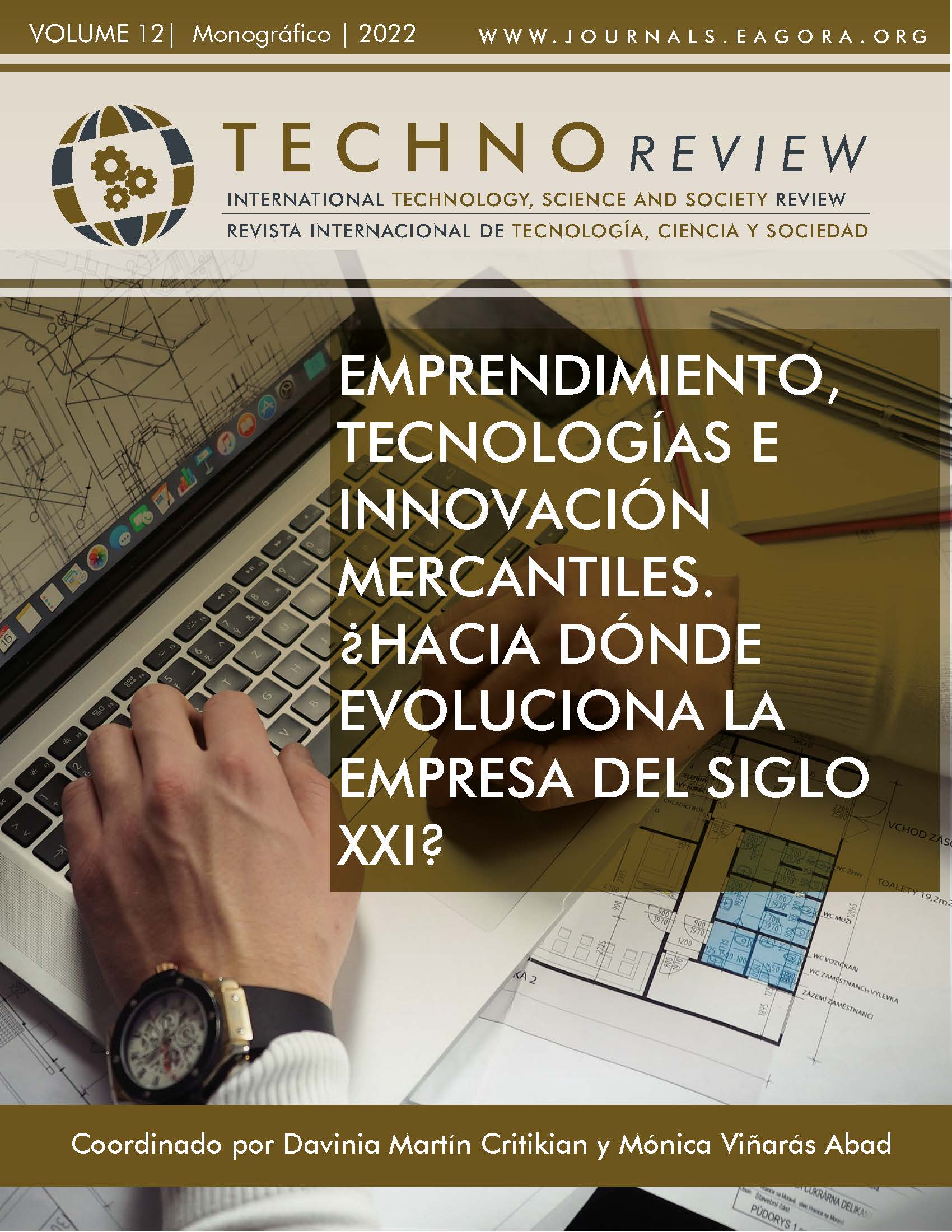Desarrollo de habilidades blandas e intención emprendedora en los estudiantes universitarios
DOI:
https://doi.org/10.37467/revtechno.v11.4468Palavras-chave:
Habilidades blandas, Intención emprendedora, Educación emprendedora, Plan de empresa, EmpleabilidadResumo
La educación en emprendimiento ha experimentado un importante auge en los últimos años, siendo imprescindible que las universidades promuevan una cultura emprendedora para optimizar la empleabilidad de sus estudiantes. Este trabajo pretende estudiar el impacto de la formación en emprendimiento sobre las habilidades blandas y la actitud emprendedora de dos grupos de estudiantes: grupo de control (área de Ciencias Sociales) y grupo experimental (área de Ciencias de la Salud), desarrollando planes de empresa. Los resultados muestran que esta experiencia contribuye a despertar la intención emprendedora de los estudiantes y les ayuda a adquirir habilidades blandas para mejorar su talento.
Referências
Ademar, H. (2003). Nuevo Tópico Formativo: “Aprender A Emprender”. Revista Novedades Educativas, 18.
Bae, T. J., Qian, S., Miao, C., y Fiet, J. O. (2014). The relationship between entrepreneurship education and entrepreneurial intentions: A meta–analytic review. Entrepreneurship theory and practice, 38(2), 217-254.mailto:https://doi.org/10.1111/etap.12095
Beckton, J. (2009). Educational development units: The challenge of quality enhancement in a changing environment. The Future of Higher Education: policy, pedagogy, and the student experience (pp. 57-68) New York: Continuum International Publishing Group.
Bell, J. (2009). Designing an executive MBA around entrepreneurship: Changing a mindset and the creation of SMEs. Journal of Entrepreneurship Education, 12, 1–12.
Bonnet, H., Quist, J., Hoogwater, D., Spaans, J. y Wehrmann, C. (2006). Teaching sustainable entrepreneurship to engineering students: the case of Delft University of Technology. European Journal of Engineering Education, 31(2), 155-167.
Braidot, N.B., Cesar, R.A., Nicolini, J. y González, V. (2008). Una estrategia para el desarrollo de competencias emprendedoras en la formación de grado en carreras de ingeniería. VI Congreso Argentino de Enseñanza en la Ingeniería.
Comisión Europea (2010). Europa 2020: Una estrategia para un crecimiento inteligente, sostenible e integrador.https://eurlex.europa.eu/LexUriServ/LexUriServ.do?uri=COM:2010:2020:FIN:ES:PDF
Dirk, D., Benson, H. y Bruce, M. (2013). The roles of learning orientation and passion for work in the formation of entrepreneurial intention. International Small Business Journal, 31(6), 652-676.
Falla, G. D. H., Avilés, A. M. S., y Diaz, V. B. (2020). Influencia de la educación superior en el emprendimiento juvenil en estudiantes universitarios: una aproxi-mación teórica. Revista Boletín Redipe, 9(8), 166-180. https://doi.org/10.36260/rbr.v9i8.1049.
Gibb, A.A. (2005). The future of entrepreneurship education - Determining the Basis for Coherent Policy and Practice. En P. Kryo y C. Carrier (Eds.). The Dynamics of Learning Entrepreneurship in A Cross Cultural University Context (pp. 44-68). Research Centre for Vocational and Professional Education, University of Tampere.
Joensuu-Salo, S., Varamäki, E., y Viljamaa, A. (2015). Beyond intentions – what makes a student start a firm?. Education + Training, 57(8/9), 853-873. https://doi.org/10.1108/ET-11-2014-0142.
James, R. F., y James, M. L. (2004). Teaching career and technical skills in a” mini” business world. In Business Education Forum, 59, (pp. 39-41). National Business Education Association.
Lanero, A., Vázquez, J. L., Gutiérrez, P. y García, M. P. (2011). The impact of entrepreneurship education in European universities: an intention-based approach analyzed in the Spanish area. International Review on Public and Nonprofit Marketing, 8(2), 111-130 http://dx.doi.org/10.1007/s12208-011-0067-8
Leroux, J. A., y Lafleur, S. (2006). Employability skills: The demands of the workplace. The Vocational Aspect of Education, 47(2), 189–196.
Liñán, F., Urbano, D., y Guerrero, M. (2011). Regional variations in entrepreneurial cognitions: Start-up intentions of university students in Spain. Entrepreneurship and Regional Development, 23 (3-4), 187-215.
Martin, B. C., McNally, J. J., y Kay, M. J. (2013). Examining the formation of human capital in entrepreneurship: A meta-analysis of entrepreneurship education outcomes. Journal of business venturing, 28(2), 211-224. https://doi.org/10.1016/j.jbusvent.2012.03.002
Montiel, H. (2007). ¿Creadores de emprendedores o creadores de empleados? El modelo educativo emprendedor del Tecnológico de Monterrey. XI Congreso de Ingeniería de Organización International Conference on Industrial Engineering and Industrial Management, Madrid, Septiembre 5-7.
Montoya, G.G. (2011). Educación emprendedora en la universidad: Educando para el futuro. Retos, 1(2), 135-154.
Moses, C.L., Olokundun, M.A., Akinbode, M., Agboola, M. y Inelo, F. (2016). Entrepreneurship education and entrepreneurial intentions: The moderating role of passion. The Social Sciences, 11, 645-653.
Muzio, D., Ackroyd, S., y Chanlat, J. (2007). Redirections in the study of expert labour: Established professions and new expert occupations. Springer.
Nabi, G., Liñán, F., Fayolle, A., Krueger, N., y Walmsley, A. (2017). The impact of entrepreneurship education in higher education: A systematic review and research agenda. Academy of Management Learning & Education, 16(2), 277-299. https://doi.org/10.5465/amle.2015.0026
Observatorio del Emprendimiento de España (2021). Informe GEM España 2021-2022. https://www.gem-spain.com/informe-gem-2021-2022-espana/
Sánchez, J. (2013). The impact of an entrepreneurship education program on entrepreneurial competencies and intention. Journal of Small Business Management, 51(3), 447-465. https://doi.org/10.1111/jsbm.12025
Soria-Barreto, K., Zuniga-Jara, S. y Ruiz-Campo, S. (2016). Educación e intención emprendedora en estudiantes universitarios: Un caso de estudio. Formación universitaria, 9(1), 25-34. http://doi.org/10.4067/S0718-50062016000100004
Täks, M., Tynjälä, P., Toding, M., Kukemelk, H. y Venesaar, U. (2014). Engineering Students’ Experiences in Studying Entrepreneurship. Journal of Engineering Education, 103(4), 573-598.
United Nations Educational, Scientific and Cultural Organization (Unesco) (1998). Declaración Mundial sobre Educación Superior en el Siglo XXI: visión y acción de la Unesco. http://www.unesco.org/education/educprog/wche/declaration_spa.htm
Yin, M. y Wang, Y. (2013). Research on the Effect of Entrepreneurship Education on College Students’ Entrepreneurial Capability. Eurasia Journal of Mathematics Science and Technology Education, 13(8), 5813-5819. https://doi.org/10.12973/eurasia.2017.01031a
Downloads
Publicado
Como Citar
Edição
Seção
Licença
Os autores/as que publicam nesta revista concordam com os seguintes termos:
- Os autores/as terão os direitos morais do trabalho e cederão para a revista os direitos comerciais.
- Um ano após a sua publicação, a versão do editor estará em acesso aberto no site da editora, mas a revista manterá o copyright da obra.
- No caso dos autores desejarem asignar uma licença aberta Creative Commons (CC), poderão a solicitar escrevendo a publishing@eagora.org







